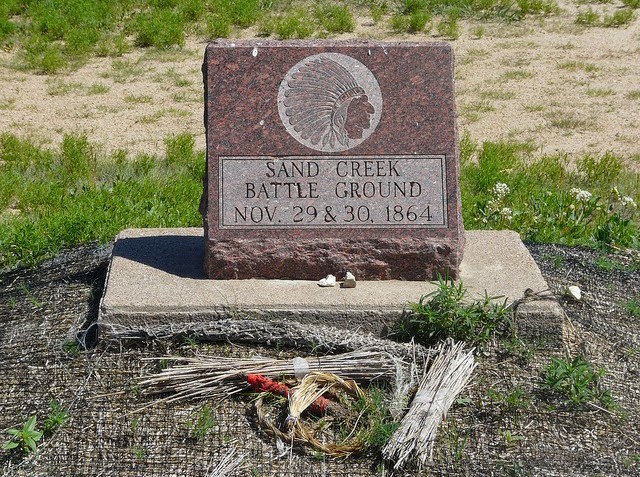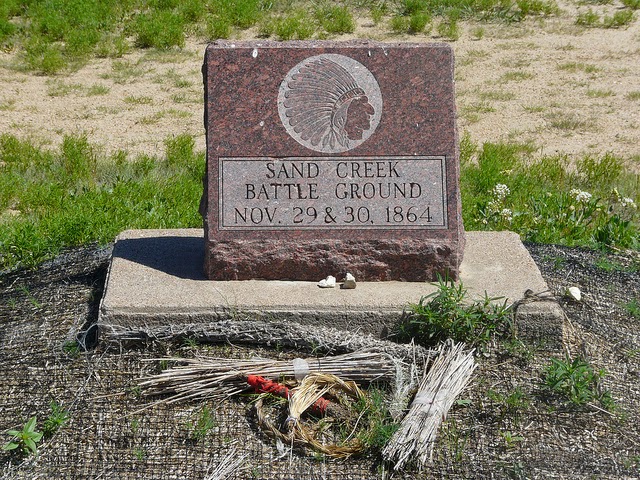By James Wilson
(Part 2 of 3)
On November 29, 1864, a body of cavalry attacked a sleeping camp of Cheyenne and Arapahoe people at Sand Creek, Colorado. Commanded by Colonel John Chivington, they rode down and massacred nearly two hundred as they lay clustered in family teepees. The Indians, roused from sleep, fought back as well as they could but were outnumbered, outgunned, and taken by surprise. Women and children were slaughtered and mutilated along with the men; babies were literally snatched from their mothers’ breasts and their heads crushed. The soldiers were initially hailed as heroes on their return to Denver; the true and horrific story of the massacre only began to come out as they days went by. This peaceful band flew an American flag and a white flag of surrender over their camp as tokens of their covenant relationship.
Captain Silas Soule forbade his men to fire on the camp. Upon his return he denounced his commander, becoming one of nineteen witnesses who testified against Chivington during the subsequent investigation leading to three different hearings. Days later Soule was gunned down on a Denver street. His killers were known but no charges were brought. Although Chivington lost his commission and his life became a trainwreck of failed businesses, incestuous marriage, and a painful death from cancer, no charges were brought against him. The stain on American history remains.
Even the land bears the marks of the slaughter. Believers of the Bible know when land is defiled by the gross shedding of innocent blood, idolatry, covenant breaking, or sexual sin the very rocks cry out per the Genesis story of Cain and Abel; other Biblical examples abound. Sand Creek – once place of flowing water and access to game – has been bone dry and utterly desolate since before anyone living can recall. Land and people cry out for healing and reconciliation, graces that can only occur in the face of repentance before God and the people so horribly wronged.
When I accepted God’s call to visit and pray with local teams in the capitols of nine western states I was knew of the coming one hundred fiftieth anniversary of Sand Creek. I felt called to go there and pray during my few days in Colorado, although I had no idea of the site’s location, nor of how to obtain permission from the appropriate Cheyenne or Arapahoe elders to visit. Permission is obtained through relationship and I knew no one in the area. Permission is a necessary act of respect, just as it would be for members of my own people if someone wanted to do something on the gravesite of our ancestors. I knew it was a matter of common courtesy no matter whose name might currently be on the title deed.
The first thing needed was to locate the site. After initially telling me the site was too distant for a day trip, Kelli, my Denver hostess, e-mailed next morning to say her husband, John, awakened practically shouting his conviction that he and I were to visit Sand Creek and he would drive. Fully confirmed now that I was called as John was, I consigned the matter of permission to my God. It would not be the first time I had known I was to visit a site at an assigned time and depend on God Himself to connect me with the right people to bless the visit. And then the phone rang.
Rhoda is a Native American woman I have known the past decade. We re-connected after a long absence during a conference call in preparation for the capitol prayer bridge trip and she promised to be at the Wyoming Capitol when I arrived. She met Gina, National Day of Prayer coordinator for the mountain states region, for the first time at that meeting, and they decided to have dinner together. When Gina mentioned my plan to visit Sand Creek Rhoda called me the next morning. After I confessed I was called to go at this time but had not made the requisite elder connections and was depending on God to close that gap, she revealed herself as a direct descendant of one of the chiefs murdered at Sand Creek. She drove five hours to meet me in Denver and another five to Sand Creek so we could wash her feet and make our act of repentance to her. She forgave and welcomed us onto the sacred land; we worshipped the Lord together through our tears and prayed healing over the people – red and white – and full reconciliation – even for the land itself.
It is a beginning. And Romans 8:28 is fulfilled again.
James A. Wilson is the author of Living As Ambassadors of Relationships and The Holy Spirit and the End Times – available at local bookstores or by e-mailing him at
praynorthstate@charter.net





